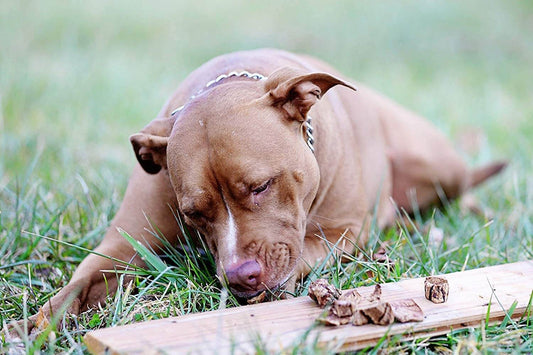Bone to Pick: How Dog Bones Benefit Canine Dental Health
Dawn Miller Jul 05, 20244 Minute ReadWe’ve just returned from another lovely afternoon walk. Another lazy day enjoying the fresh air, sun and a slight breeze. My pooches and I now have an important decision to make: which dog bone is best?
The right dog bone benefits canine dental health. That’s not the only reason I do my homework when choosing new bones. Delicious dog bones are also positive reinforcement for good behavior.
Dog Bones Can Be Beneficial to Dog Dental Health by Reducing Plaque and Tartar Buildup
Dogs’ teeth accumulate plaque and tartar similar to human teeth. However, as is often said, what is out of sight is out of mind. Chances are at least one of my three dogs has plaque on her teeth. I won’t be able to tell for sure unless I schedule a visit to the vet’s office.
The right dog bones for Bruno, my Lab Mix, win the battle against plaque and tartar. There’s no need to regularly brush my dog’s teeth when dog bones can do the work. By choosing dog bones wisely, I minimize the amount of oral bacteria that moves into her bloodstream.
Oral bacteria in dogs damages internal organs including:
- Kidneys
- Liver
- Lungs
- Heart
Though few know it, periodontal disease is the most common disease suffered by dogs. If excess plaque builds up on dogs’ teeth, it will cause inflammation. Inflammation damages the tissues that keep teeth securely positioned.
Plaque eventually turns into tartar after interaction with saliva. A daily dog bone, ideally as a treat after a long and fulfilling walk, helps reduce plaque and gum inflammation to prevent periodontal disease.
The reversible type of periodontal disease in dogs is referred to as gingivitis. Gingivitis has the potential to cause the gum to detach from teeth, forming a pocket. Plaque bacteria toxins can destroy periodontal tissue even more.
The worst periodontal disease in dogs is referred to as periodontitis. Periodontitis causes teeth to loosen to the point that they fall out of the mouth. In the worst-case scenario, all 42 of a dog’s teeth will fall out.
Free Marrow Refill Recipe Guide
Promote Healthier Teeth and Gums With the Right Dog Bone
No two dog bones are the same. Some dog chews for dental health made abroad are laden with harmful chemicals and synthetic ingredients. Other dog bones are of higher quality, containing:
- Healthy marrow
- Salmon oil
- Sources of protein
- Calcium carbonate
Here’s the magic of healthy dog bones: high-quality bones scrape plaque off of the teeth for improved oral health. However, dog bones are not yet capable of scraping tartar away.
Though dog bones cannot clean a dog’s mouth to the level possible with professional dental dog teeth cleaning performed by a veterinarian, they certainly help improve oral health. This is precisely why I’ve developed a post-walk bone routine with Bruno. The right dog bone after our walk helps fight gum disease for dog tooth preservation.
I gave my late Golden Retriever, Max, raw dog bones for extra nutrition. I do the same with Bruno. The combination of improved oral hygiene and nutritional value ultimately enhances our furry friends’ well-being and longevity.
The icing on the cake is that a daily raw dog bone at my home reduces the frequency of vet visits. Vet appointments are expensive and often require an anesthetic for thorough dog teeth cleaning.
There’s no sense fussing around with toothpaste and water with an attempt at DIY at-home dog dental cleaning when a dog bone will help prevent the accumulation of plaque. I look closely when my dog smiles and see her gums are clean and healthy thanks to a daily raw dog bone.
Pick a Dog Bone With Calcium
Take a close look at the ingredients of the best dental chews for dogs before buying. The best dog bones contain calcium. Calcium is essential for maintaining bone structure. Calcium also strengthens teeth. Calcium even helps with clotting. Clotting prevents the loss of blood from harming blood vessels.
The ingredients of bones best for dog teeth include phosphorus in combination with calcium. This combination of minerals enhances bone structure including teeth and jawbone health.
To Cook or Not to Cook? That is the Question
Some dog owners cook dog bones to soften them for a more enjoyable chewing experience. Though there is the potential for an extra hard bone to damage a dog tooth, tossing a cooked bone onto the floor brings problems.
Cooked bones are soft to the point that they are likely to break into small pieces, some of which might get caught in my dog’s throat. A bone fragment lodged in the throat is a choking hazard.
I try to sit near my dogs when it is bone-eating time. Dog owners should also know that some raw bones for dogs with pre-existing dental challenges might damage the teeth. Raw bones also have the potential to damage puppies’ teeth. There's also a chance of choking so pay attention!
Final Thoughts on Picking Dog Bones
As dog owners, we’re the only line of defense between potentially harmful bones and our furry bundles of joy. The choices between dog bones are shaped by information. Do your homework and you’ll make a well-informed decision.
As an example, I’m often torn between raw meaty bones and recreational bones. Recreational bones are those of the weight-bearing variety, derived from cows, sheep and deer. If I know Bruno will be inside for a while, I give him a recreational bone that will last.
The raw meaty variety consists of layers of connective tissue and muscle. Raw meat bones have small pieces of flesh that have the potential to form bacteria. Exposure to bacteria can make dogs sick.
When in doubt, I throw it out as there’s nothing more important than my dog’s well-being. Bruno’s health is my top priority so I give him dog bones that I know he’ll love and also keep him healthy.
Available On:
Disclosure: This article may contain affiliate links, which means we may earn a small commission if you make a purchase through these links—at no extra cost to you. We only recommend products we trust and believe will benefit you and your K9.






